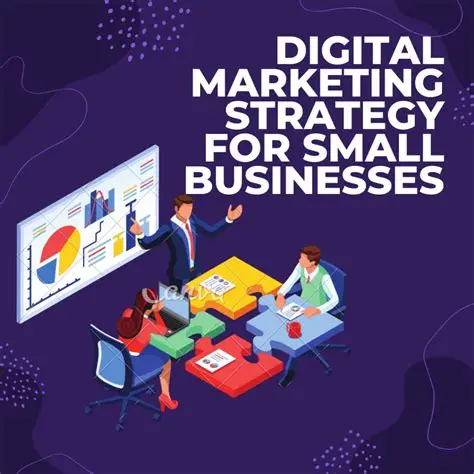Artificial Intelligence (AI) has moved from a futuristic concept to an everyday business tool. In 2025, small businesses are leveraging AI more than ever to compete with larger companies in the digital space. From content creation to data analysis and customer experience, AI is fundamentally reshaping digital marketing strategies—making them smarter, faster, and more cost-effective.
One of the most visible ways AI is making a difference is in content creation and personalization. Tools powered by AI, like ChatGPT and other language models, help small businesses create high-quality content quickly. Whether it’s blog posts, product descriptions, or social media captions, AI ensures content is engaging and tailored to the right audience. Personalized emails, product recommendations, and even website experiences are now possible without a full-time marketing team—thanks to machine learning algorithms that understand customer behavior.
AI also brings automation to ad targeting and campaign optimization. Small businesses can now run pay-per-click (PPC) or social media ad campaigns that automatically adjust targeting, bidding, and creative elements in real-time. This level of automation was once reserved for large corporations but is now accessible and affordable to small businesses looking to maximize every marketing dollar.
For companies looking to get discovered online, search visibility remains critical. That’s where partnering with an enterprise SEO company can give small businesses an unexpected edge. These companies use AI-powered tools to conduct deep keyword research, competitor analysis, and performance tracking. By implementing AI-enhanced SEO strategies, even small players can climb search rankings, attract qualified traffic, and compete with larger competitors in search engine results.
Another key benefit of AI is in predictive analytics. Instead of guessing what might work, small businesses can now use data-driven insights to anticipate customer needs and behaviors. AI helps identify trends, predict sales cycles, and optimize marketing efforts based on user data. This foresight allows businesses to plan more effective campaigns and allocate resources with confidence, reducing waste and increasing ROI.
Automation also plays a big role in customer relationship management (CRM). AI-powered chatbots and virtual assistants provide real-time customer support across websites and social media platforms. This helps small businesses offer 24/7 service without needing large support teams. Plus, these tools can qualify leads, answer FAQs, and even schedule appointments—freeing up human resources for more complex tasks.
For long-term online growth, SEO remains an essential component of digital marketing. Small businesses are increasingly turning to enterprise SEO services to bring structure and scalability to their search strategy. These services use AI to continuously audit websites, optimize content, and monitor algorithm changes. As Google’s search algorithms become more complex, having AI-driven SEO services ensures small businesses stay compliant, visible, and competitive.
Social media has also seen massive changes through AI. Scheduling tools now use predictive models to suggest the best times to post. AI analyzes performance data to determine which types of content resonate most with specific demographics. Video editing tools powered by AI can generate highlight reels, captions, and thumbnails—all within minutes. These efficiencies allow small businesses to maintain a strong, consistent online presence without a large marketing staff.
Many small businesses also struggle with measuring results and adjusting strategies quickly. That’s where consulting an enterprise SEO agency can be transformative. These agencies use AI analytics dashboards to monitor website traffic, user engagement, backlink health, and conversion rates in real time. With their support, small businesses can move away from “guesswork marketing” and toward a more scientific, data-led approach. Agencies provide not only tools but also the strategic insight needed to interpret and act on AI-generated data.
Voice search, visual search, and AI-generated recommendations are also shaping the future of online discovery. In 2025, small businesses must optimize not just for text-based search but for how users speak or interact with visual content. AI tools help analyze voice search trends and adapt keyword strategies accordingly. Visual recognition technology, meanwhile, makes it easier for products to be found through image search, especially on mobile devices.
To bring all these innovations together, investing in comprehensive enterprise SEO solutions is proving essential. These solutions bundle advanced keyword research, content optimization, site speed improvements, schema markup, and AI-driven audits into a unified approach. For small businesses, this means having access to enterprise-level performance without the overhead. The combination of AI and strategic SEO execution ensures long-term visibility, higher conversion rates, and measurable growth.
Conclusion
In 2025, artificial intelligence (AI) has become an essential tool—not just a luxury—for small businesses navigating the fast-paced digital economy. With increasing competition online, small enterprises are turning to AI to streamline operations and stay relevant. AI-driven tools now automate everything from social media content creation and ad targeting to customer service and data analytics. This not only saves time and reduces costs but also improves accuracy and personalization, helping businesses connect with customers in more meaningful ways.
Search engine optimization (SEO), once a time-consuming task, is now powered by intelligent algorithms that adapt quickly to trends, ensuring higher visibility and better engagement. Additionally, AI-powered chatbots and customer service solutions allow businesses to respond faster, offer 24/7 support, and retain customer loyalty more effectively. However, the success of AI adoption depends largely on partnering with digital experts who understand both technology and business needs.
By using AI strategically, small businesses are no longer just surviving—they’re competing at levels previously dominated by larger players. Embracing AI enables smarter decision-making, more agile marketing, and sustainable growth. With the right guidance, small businesses can future-proof their operations and thrive in the ever-evolving digital landscape.

